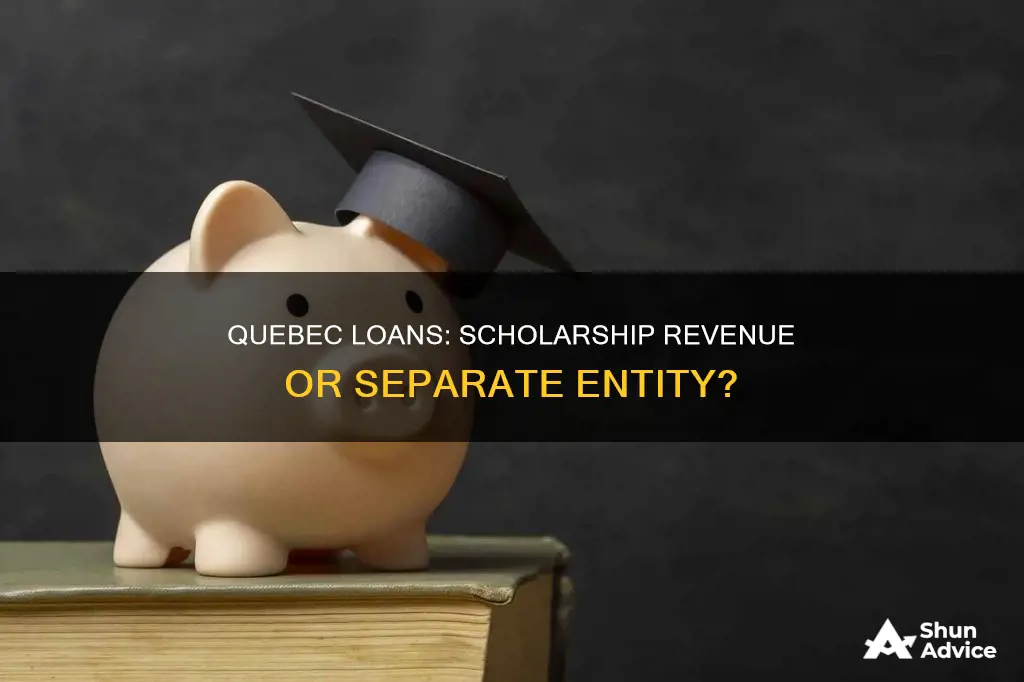
Quebec offers a range of financial aid options for students, including scholarships, loans, and grants. While scholarships and grants are typically considered non-repayable financial support, loans are repayable financing options. In terms of tax implications, scholarships, fellowships, and bursaries received for enrolment in a post-secondary school program are generally not taxable if the student is a full-time qualifying student. However, it is important to note that the scholarship exemption is limited to the extent that the award supports enrolment in the program. On the other hand, loans are not considered taxable income, as they are expected to be repaid. When it comes to reporting these sources of funding on tax returns, scholarships and bursaries are typically reported separately from loan amounts.
What You'll Learn

Quebec Perspective Scholarships
The Québec Perspective Scholarship Program (PBPQ) is a government-funded initiative that offers scholarships to full-time students enrolled in various programs at Québec CEGEPs, private colleges, and universities. The program aims to encourage students to pursue post-secondary studies in fields deemed a priority for the province's workforce planning. To be eligible, students must be Québec residents studying full-time in the province and have successfully completed a full-time study term according to the eligibility requirements in a targeted program of study. Undergraduate students in a freshman (U0) program may be eligible for PBPQ if they successfully complete a minimum of 12 credits at the U1 level in a given term.
The PBPQ funding is not based on financial need, and students can receive up to $7,500 in combined scholarships, awards, and/or bursaries in a calendar year without impacting their AFE assessment for the academic year. Any income from scholarships, awards, or bursaries exceeding $7,500 will be included in the AFE's calculation of a student's contribution. The Ministère de l’Enseignement Supérieur has announced that the Winter 2025 semester will be the last eligible term for the current PBPQ program. However, students enrolled in eligible programs as of Winter 2025 may continue to apply for and receive the bursary until they complete their program, subject to certain conditions yet to be confirmed by the Ministry.
The Quebec Perspective Scholarship is also available to students receiving government student aid from outside Quebec, and it is not the only scholarship or bursary option for students in the province. Elementary and secondary school scholarships and bursaries are generally not taxable, and the same applies to post-secondary scholarships, fellowships, and bursaries if received for enrolment as a full-time qualifying student. However, post-doctoral fellowships are taxable. Students can refer to the Government of Québec's Bourse Perspective website for a list of eligible programs and further details on the scholarship program.
Prequalification: A Loan Guarantee or Just a First Step?
You may want to see also

Quebec loans and bursaries
The Quebec government offers financial assistance to students enrolled in full-time or part-time studies through scholarships, loans, and bursaries. This support is available for students pursuing vocational, college, or university programs, whether they are studying in Quebec or abroad.
Loans and bursaries provided by the Quebec government are not considered taxable income. Students are not required to repay any amount during their studies, and the interest rates on these loans are kept low. Additionally, the Loans and Bursaries Program offers a non-refundable tax credit.
When it comes to scholarships, fellowships, and bursaries in Canada, the tax implications depend on the level of education and the nature of the program. Elementary and secondary school scholarships and bursaries are not taxable. For post-secondary scholarships, fellowships, and bursaries, the tax exemption applies if the student is enrolled as a full-time qualifying student. The exemption is limited to the extent that the award supports the student's enrolment, such as tuition fees and program-related costs.
It is important to note that the tax treatment of scholarships, loans, and bursaries may vary, and individuals should consult official sources for the most up-to-date and accurate information. The relevant government websites, such as Revenu Québec and Canada Revenue Agency, provide detailed guidance on how to report and treat these forms of financial assistance for tax purposes.
Purchasing Power: Loans and Employee Benefits
You may want to see also

Tax exemption criteria
In Canada, scholarships, fellowships, and bursaries are generally considered taxable income. However, there are specific tax exemption criteria that you can refer to if you want to determine whether your scholarship or loan is tax-exempt. Here are the details:
- Elementary and Secondary School Scholarships and Bursaries: Elementary and secondary school scholarships and bursaries are not taxable. This means that if you received a scholarship or bursary to attend elementary or secondary school, you do not need to include this amount as income on your tax return.
- Post-Secondary School Scholarships, Fellowships, and Bursaries: Post-secondary school scholarships, fellowships, and bursaries are not taxable if received in 2024 for enrolment in a program where the recipient is considered a full-time qualifying student for 2023, 2024, or 2025. This exemption only applies to the extent that the award supports the student's enrolment in the program. If the scholarship, fellowship, or bursary is related to a part-time program, the exemption is typically limited to the tuition paid, plus the costs of program-related materials.
- Research-Based Post-Secondary Programs: A post-secondary program that consists mainly of research is eligible for the scholarship exemption, but it must lead to a college or CEGEP diploma, or a bachelor's, master's, or doctoral degree (or an equivalent degree). In this case, the scholarship exemption allows you to exclude all or part of the amounts received as scholarships, fellowships, or bursaries from your taxable income.
- Artists' Project Grants: If you receive an artist's project grant, you may be able to claim certain exemptions. This applies if the grant is used to produce a literary, dramatic, musical, or artistic work and is not related to business or employment. The exemption amount is typically limited to the reasonable expenses incurred to fulfil the conditions of the grant, up to the total amount of the grant included in your income calculation.
- Prescribed Prizes: Prizes for achievements in a field of endeavour ordinarily carried on by the recipient are not taxable, as long as they are not prescribed prizes. A prescribed prize is typically given as a reward for employment or business-related achievements.
It is important to note that these criteria are subject to change over time, and there may be additional considerations not mentioned here. Therefore, it is always advisable to refer to the latest guidelines provided by the Canada Revenue Agency or consult with a tax professional to determine your specific situation.
Principal Retirement: 401k Loans and Their Impact
You may want to see also

Scholarship eligibility
Quebec offers a range of scholarships to support students pursuing post-secondary education in the province. One notable scholarship is the Quebec Perspective Scholarship Program (QPSP), which aims to encourage students to pursue diplomas in programs that lead to employment in fields experiencing workforce shortages. To be eligible for the QPSP, applicants must meet specific requirements:
Citizenship and Residency:
You must be a Canadian citizen or a permanent resident and be considered a Quebec resident.
Enrollment in Targeted Programs:
You must be enrolled in a targeted college or university program from the list of eligible programs. These programs are designed to increase the number of qualified individuals in essential public services and strategic economic sectors facing workforce shortages.
Completion of Study Terms:
You must have completed your full-time study term or your part-time study term if you attended school on a part-time basis but were deemed a full-time student due to applicable requirements.
Respecting Maximum Eligible Study Terms:
There is a maximum number of eligible study terms based on the level of education. For college, the maximum is 6 terms, while for undergraduate university studies, it ranges from 6 to 8 terms. Master's and doctoral studies have 5 and 15 eligible terms, respectively.
No Concurrent Scholarships:
You cannot be a beneficiary of the Excellence Scholarships for Students in Education Programs for the period covered by your QPSP application. However, you can receive the QPSP even if you are a beneficiary of the Parcours pour la mobilité étudiante bursaries or the Loans and Bursaries Program for Full-Time Studies.
It is important to note that scholarships, fellowships, and bursaries are generally not considered taxable income in Canada, including in Quebec. However, there are specific conditions and exclusions, so it is essential to consult official sources for the most accurate and up-to-date information.
Prime Lending: Selling Loans and Mortgage Deals
You may want to see also

Non-taxable scholarships
Scholarships, fellowships, and bursaries are generally considered taxable income. However, there are certain conditions under which they are non-taxable. In Canada, elementary and secondary school scholarships and bursaries are not taxable. Post-secondary scholarships are also non-taxable if received for enrolment in a program in which the student is considered a full-time qualifying student. This exemption is limited to the extent that the award supports the student's enrolment in the program. In the US, scholarships are non-taxable if the recipient is a degree-seeking candidate, attends a qualified educational institution, and the funds are used for qualified education expenses. The IRS defines a candidate for a degree as someone who either attends primary or secondary school or college to pursue a degree. Scholarship funds used for non-qualified expenses like room and board are typically taxable.
In Canada, if you received a scholarship, you must report it on your tax return. However, as long as you correctly fill out the tax forms, the income is usually non-taxable. In the US, you must report any portion of a scholarship that is included in your gross income on your tax return. If the scholarship is non-taxable, you do not need to include it in your gross income.
It is important to note that the tax treatment of scholarships, fellowships, and bursaries may vary depending on the specific circumstances and the country's tax laws. It is always recommended to consult the relevant tax authorities or a tax professional for the most accurate and up-to-date information.
Prosper's Refinance Loans: Pros, Cons, and the Process
You may want to see also
Frequently asked questions
No, Quebec loans are not considered scholarship revenue. Loans are a repayable financing option for students, whereas scholarships are non-repayable financial support.
A loan is a repayable form of financial aid, often provided by the government or banks, to support students' education. Scholarships, on the other hand, are non-repayable financial awards that are typically merit-based and do not need to be paid back.
Scholarship revenue is generally reported on your tax return. In Quebec, you would enter the amount received in box O of your RL-1 slip, identified by the code "RB". This amount is usually not taxable, and you can claim a deduction.







